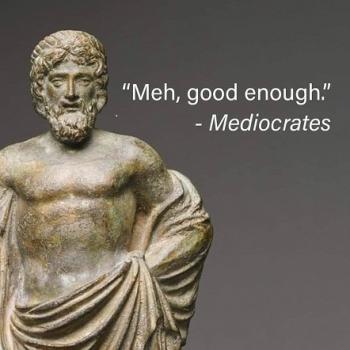Evangelicals wanted not just lip service. They wanted to be taken seriously, within the powerful institutions like the federal government. In the process, they found in the Republican party some folks who shared their priorities, specifically conservative Catholics, who welcomed them to the table. President Reagan appointed prominent evangelicals to senior positions, individuals such as Gary Bauer and C. Everett Koop. Then the story became that evangelicals quite simply were going to be at home with Republicans in ways that they had not been at home among the Democrats.
In the past five to seven years, however, there has been a reawakening of the religious imagination of the Democratic party. You have leaders such as Nancy Pelosi and Barack Obama, who recognize that Democrats must learn to form religious justifications for Democratic policies as well. They could not cede the field to the Republicans.
But I think what's happened is that we have seen a maturing on both sides of the political aisle of how they can use religious rhetoric to advance their public policy agenda. What has been most unfortunate -- and has been a real downfall for evangelical influence -- has been the fact that a number of evangelical politicians have been publicly outed as hypocrites. You cannot opine about the family and then do very little to nurture your own. That's a real problem that the evangelical community faces. Hypocrisy probably hurts evangelical political influence more than any other variable, more than backbiting or jealousy.
Are there other trends right now that will shape the future of the evangelical church in America?
Two things have to be borne in mind when you consider the future of groups. One is demographics, and the other is institutions.
Demographically, evangelicals are going to be bigger players in certain communities. They are becoming more prominent in the Asian-American community and they are building more international ties. That's going to change evangelicals and their cultural influence. To take just one small example, look at the number of American churches now that are sponsoring short-term missions initiatives. Previous generations of evangelicals would send a small number of professional missionaries who would stay in the field their entire career. Yet evangelicals today are funding hundreds of people to go and do short-term work for two or three weeks. That's not only increasing their global reach, it's also making more evangelicals aware of global issues than ever before. It's increasing those relational ties, and evangelicals are going to be better global citizens because they care about what's going on in Zimbabwe and Indonesia. That demographic shift is very important, and one that hasn't been attended to as well as it ought to be.
Then, institutions that used to be off-limits for evangelicals, either because they were excluded or because they had no interest in being part of them, are more open to evangelicals joining their ranks than ever before. Harvard is a great example, but you can see this happening in the arts as well as in higher education. Think about the Museum of Biblical Arts (MOBiA), which is located in New York. It's now seen as a very legitimate player in the world of high art, and it has generated respect from the Metropolitan Museum of Art. That creates more opportunities for Christians interested in the arts, and for those Christians who care about using their faith to influence the artistic world.
The more of those kinds of successful ventures evangelicals can have, the more likely they are to play a role in changing the conversation in the upper reaches of American society.
The great temptation that must be borne in mind is acculturation. Evangelicals are not immune to that temptation in any way, shape, or form. That's a great peril, and I don't hear enough pastors talking about how their congregations can retain their Christian identity in the midst of pressures to accommodate to the surrounding culture. Pastors need to explain how they can be qualitatively different from others -- how they can be more faithful, more loving, even more righteous than others. The only way we will decisively demonstrate our distinctive difference is when we are willing to give up the privileges that come with the cultural influence we wield.





